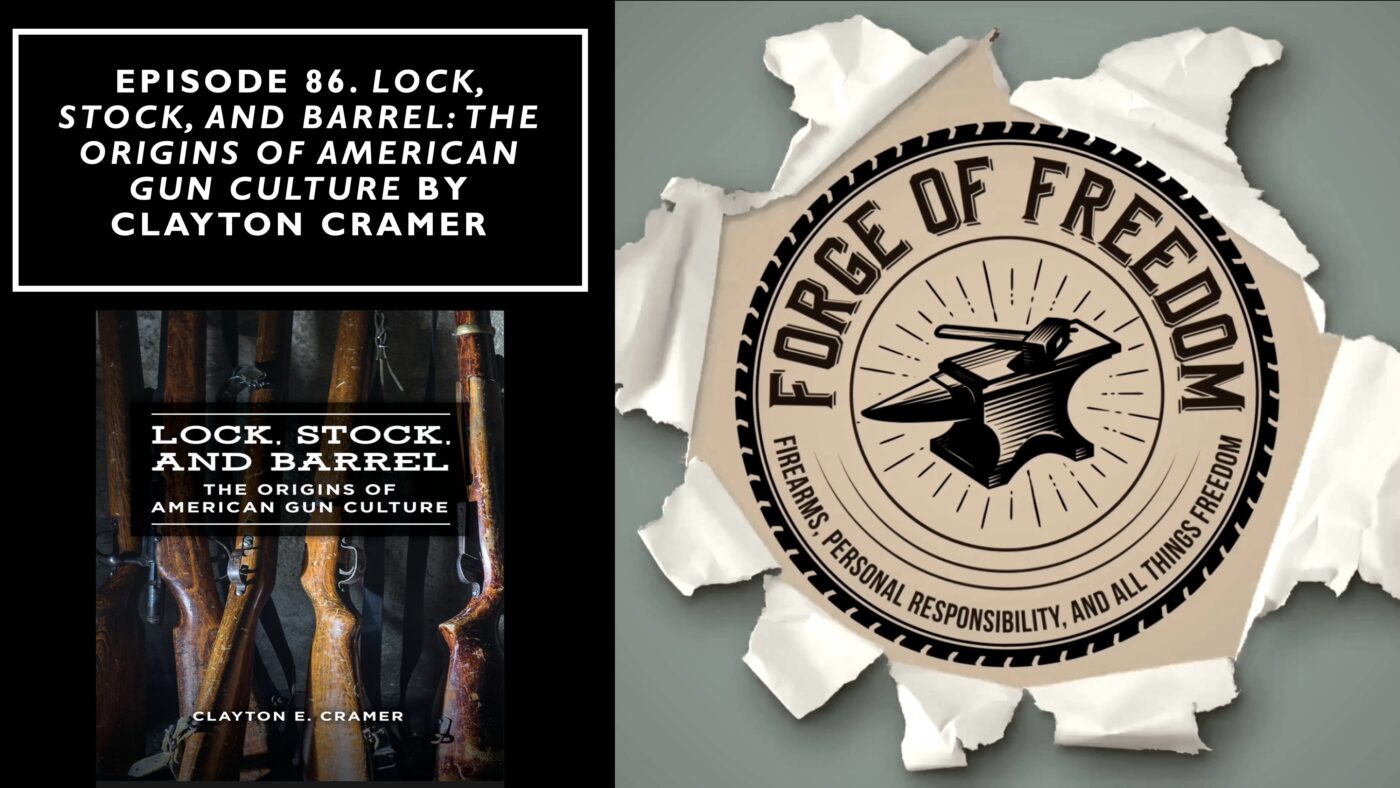Show Notes:
Episode 86. Lock, Stock, and Barrel: The Origins of American Gun Culture by Clayton Cramer
Alex Ooley interviews Clayton Cramer, author and professor of history, about his work on American gun culture and the impact of recent Supreme Court decisions. They discuss the implications of the Bruen decision and the constitutional standards for gun laws. They also explore historical analogues and the lack of evidence supporting the prohibition on people subject to domestic violence restraining orders.
The conversation highlights the importance of accurate historical research in understanding gun culture and the Second Amendment. In this conversation, Clayton Cramer discusses the historical laws and cultural practices that required gun ownership in early America. He highlights laws that mandated firearms possession in churches, for self-defense, and for protection against Indian attacks. Cramer also emphasizes the importance of hunting as a reason for gun ownership. He refutes the notion that gun culture was created by gun manufacturers through marketing, and he warns against the dangers of fake history. Cramer shares his process of collecting source material for his book and discusses his involvement in various gun-related legal cases.
Cramer also shares insights from his book ‘My Brother Ron’ on the decline of the mental health system and its connection to mass murders.
Takeaways
- The Bruen decision has put states with restrictive gun laws on notice that there is a right to bear arms for self-defense outside of the home.
- Gun laws must conform to the standards recognized in 1791 when the Second Amendment was ratified.
- There is a lack of historical analogues to support the prohibition on people subject to domestic violence restraining orders.
- The destruction of the mental health system has contributed to the increase in mass murders in recent years.
- Early American colonies had laws and cultural practices that required gun ownership for various purposes, including attending church and participating in the militia.
- Hunting was a significant reason for gun ownership in early America, as the land was abundant with wildlife.
- Fake history can be dangerous and misleading, and it is important to consult original source material to understand the true historical context.
- Gun culture in America predates the marketing efforts of gun manufacturers and has deep roots in the country’s history and culture.
- Clayton Cramer has been actively involved in legal cases related to gun rights, providing expert declarations and rebuttals to support the Second Amendment.
Chapters
00:00 Introduction and Background
02:07 The Impact of the Bruin Decision
03:05 Overview of Supreme Court Cases: Heller, McDonald, Bruen, and Rahimi
07:05 Historical Analogues and the Constitutionality of Gun Laws
11:47 Comparing Surety Bond Laws and Affray Laws
14:18 The Argument of Dangerousness
17:21 Racist Laws and the Justification of Gun Laws
20:26 The Range Case and the Distinction between Dangerous and Non-Dangerous Individuals
22:44 Transition to History and Writing Career
30:54 The Book ‘My Brother Ron’ and the Mental Health System
38:38 Revisionist Historians and the Gun Culture
44:48 Refuting Claims of Rare Guns and Marketing Influence
46:54 Researching Original Source Material and Historical Laws
47:52 Historical Laws Requiring Gun Ownership
48:44 Laws Requiring Firearms in Church
49:02 Arming for Self-Defense and Indian Attacks
49:33 Hunting as a Reason for Gun Ownership
50:15 Encouragement to Acquire Firearms
50:31 Firearms Requirement for Property Ownership
50:49 Firearms for Indentured Servants
51:03 Militia Duty and Federal Law
52:29 The Danger of Fake History
53:19 Collecting Source Material for the Book
55:09 Rebutting Misleading Declarations
56:50 Gun Culture and Marketing
57:59 Guns as a Fundamental Part of American Culture
58:54 Clayton Cramer’s Work on Gun Cases
01:03:28 Victory in California Concealed Carry Case
01:05:54 Challenging Washington State’s Magazine Ban
01:09:42 The Importance of Armed Citizens
01:11:14 The Danger of Rewriting History
01:13:11 Addressing Key Questions in the Book
Resources:
Lock, Stock, and Barrel: The Origins of American Gun Culture: 9781440860379: Cramer, Clayton E.: Books
https://www.amazon.com/Lock-Stock-Barrel-Origins-American/dp/1440860378
Clayton Cramer’s Published Books
https://claytoncramer.com/books/books.htm
My Law Review and Other Referenced Journal Articles
http://www.claytoncramer.com/scholarly/journals.htm#citations
Clayton Cramer – Blogspot
https://claytonecramer.blogspot.com/
May, et al. v. Bonta – Michel & Associates, P.C.
https://michellawyers.com/may-et-al-v-bonta/
https://michellawyers.com/wp-content/uploads/2023/12/2023-12-20-Order-Granting-Plfs-MPI.pdf
https://michellawyers.com/wp-content/uploads/2023/12/2023-12-20-Preliminary-Injunction.pdf
The Federalist Number 46, [29 January] 1788
https://founders.archives.gov/documents/Madison/01-10-02-0261
Why People Fall for Fake History – Intellectual Takeout
https://intellectualtakeout.org/2017/12/why-people-fall-for-fake-history/
Lock, Stock, and Barrel: The Origins of American Gun Culture by Clayton Cramer – Gun Culture 2.0
Clayton Cramer | CWI Directory
https://cwi.edu/person/faculty/clayton-cramer
[PDF] Lock, Stock, and Barrel by Clayton E. Cramer eBook | Perlego
https://www.perlego.com/book/4164899/lock-stock-and-barrel-the-origins-of-american-gun-culture-pdf
Armed Church Security in Colonial America – Gun Culture 2.0
https://gunculture2point0.wordpress.com/2018/10/01/armed-church-security-in-colonial-america/
First Reflections on National Church Security Conference – Gun Culture 2.0
Tags:
#liberty
#freedom
#responsibilities
#personalresponsibility
#history
#heritage
#culture
#firearms
#guns
#books
DISCLAIMER: This podcast is for informational purposes only and should not be considered legal, medical, or financial advice. The views expressed in this podcast are those of the hosts and guests and do not necessarily reflect the views of any organizations or individuals they may mention. The hosts and guests are not liable for any damages that may result from someone listening to this podcast.

